
Features | Lists
By The Staff
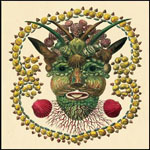
10 :: Akron/Family
Akron/Family
(Young God)
Sometimes peer pressure is a good thing. I was the last CMGer to listen to Akron/Family, and even with months of advance warning, I was in no way prepared for what I was about to hear. I don’t think any of us were, and that’s what makes Akron/Family so impressive. Unlike Sufjan Stevens’ Illinois, which was (fantastic, but also) at least reasonably predictable, Akron/Family comes straight from left-field; along with great songwriting and musicianship, no other album in recent memory contains as many unexpected twists and turns.
Akron/Family is like climbing a snowy mountain, all switchbacks and unsteady footing. Around each bend lies an unexplored new path: “Before And Again” mixes electronic beeps with more traditional folk instrumentation before exploding into percussion during the song’s final minute, and “Suchness” begins like an old-time blues recording and shifts into Flaming Lips grandeur. Everything changes – recording fidelity, instruments, volume – but even when Akron/Family plays more straightforwardly, as on “Italy,” the song is bolstered by the idiosyncrasy of a rocking chair creaking along with the music. “I’ll Be On The Water” adds fuzzy field recordings to a beautiful ballad, leading up to the album’s high-reaching peak. No discussion of this album can ignore “Running, Returning”: easily the most rhythmically intense piece, the song spends two minutes pounding away before dissolving into delicate guitar picking and finally ascending into electric, Jeff Buckley territory.
The album’s second half is a slow descent from “Running, Returning,” but is no less engrossing or inventive. “Shoes” ends with a triumphant vocal chorus – “You float away / and find yourself laughing / into thin air,” a sunny precursor to the sinister “Lumen,” in which Ryan Vanderhoof wails “I’m falling further than I have ever been.” “How Do I Know,” like “I’ll Be On The Water,” is simplistic, beautiful folk, and the album concludes gorgeously with “Untitled.” As voices and strings shimmer together, Vanderhoof sings “There’s never a next time.” With Akron/Family’s consistent reinvention, he’s right. Whatever their releases in the future, we’ll never hear an album quite like this again.
David Greenwald
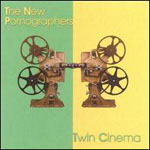
9 :: The New Pornographers
Twin Cinema
(Matador)
If music really is the new pornography, then the New Pornographers are smut peddlers of the most gratifying kind. They nibble on the ear, grab the crotch, whisper minor poetry; their advances are layered, direct and playful, innocent and insidious. Lust is laced with love, or vice versa. The lyrics and the vocal harmonies, Fancey’s guitar licks, Bejar being weird, Newman being classic, hooks imported straight from nirvana, sweet melodies and giddy structures, every pop music trick keen and cleverly implemented, Dahle delivering one of the most perfect kit performances of 2005: one can look at Twin Cinema from a dozen different angles, and the view always dazzles.
Bejar and Neko’s contributions aren’t quite as fantastic as they could be, but that’s not much of a negative. Still, maybe they leave a little slack. Well, Dahle picks it up, keeping rock-solid time and peppering with a hundred fills. Truly, the man fills like there’s no tomorrow. Listeners who don’t care for fills might be out of luck, but what’s their problem, anyways? Fills are delicious, and Dahle does them right, and if anyone considers this the best New Pornos album, it might be thanks to him. According to the religious authorities of yesteryear, rock ‘n roll was the devil’s music because of the beat. While the other Pornographers do their usual, well-practiced acts, the bass drum thuds more insistently, the cymbals splash more rapturously, and the toms are tribal. If nothing else, Twin Cinema is the New Pornographers at their most arousing.
Chet Betz
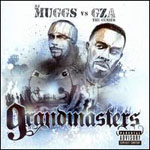
8 :: DJ Muggs vs GZA
Grandmasters
(Angeles)
A warning: this might be the longest year-end blurb in history.
I had this college chum, K. Bing, and he and I were chums based on one thing alone. He liked Wu-Tang. I liked Wu-Tang. He liked that I liked Wu-Tang. Hence, chumship. As college students are wont to do, I was sitting on a couch, playing a video game, listening to Liquid Swords, living the good life, basically. K. Bing walks by my open dorm door, stops, back-pedals, sticks his body in (first time he’s ever noticed me), and he’s nodding his head, grinning, pointing at me as if I know some great secret, light of the zealot in his eyes. A couple weeks later he summons me to his room. Bing places me on the lower bunk and then begins, launching into a three hour rant about the unsurpassable, inimitable virtue of the Clan. I think there was a PowerPoint presentation, too, or at least pie charts. Bing owned every Wu-Tang album and every album remotely Wu-related; Bing didn’t listen to anything else except for a smidge of Immortal Technique (he did seem to like Illogic’s “Time Capsule” the one time he heard it in my room); and Bing explained how no other group of artists had the integrity or the rigorous rap ethic or the dense stylistic schema or just, man, the fuck-all of Wu-Tang. Forget disciple, kid was an apostle; his rabid, narrow-minded Wu-devotion would have even Clay Purdom clearing throat. I wish I could bring you his comments on Grandmasters, but for all I know, K. Bing now walks the earth with glock and sword, ready to commit seppuku the moment Ghostface slips into another R&B guest spot. Wherever he is, though, I’m sure that K. Bing loves the shit out of this album, and I’m sure that he’s propagandizing it in every social opportunity that presents itself. Say, for instance, Thanksgiving dinner.
I have to admit that I myself am merely a “big fan” of Wu-Tang. It’s a yellow belt. For instance, when my hip-hop collection got jacked, no, I didn’t immediately go out and re-purchase two copies of every Wu album, the one half meant to be left unopened and enshrined. I won’t even give U-God the time of day. But I, too, love the shit out of Grandmasters. GZA’s always been my favorite (like quiet and intelligent girls are my favorite), and Muggs delivers the goods 8 out of 10 times, which is a hell of a fine ratio for anyone who’s ever had anything to do with Cypress Hill. And, seriously, have you listened to rap radio lately? I have, in constant hopes of “Hate It or Love It” or “Stay Fly” or “Outta Control” or “Can I Have it Like That,” but some dangerous cro-magnon movement’s at work, as if today’s dime-a-dozen producers (with names like DJ Squee and Rob “Bump” Brown) collectively decided that neanderthal Death Row beats just weren’t primitive enough. Most of it consists of thin, two-dimensional drum programming and Casio lines unfit for God, man, child, animal and Diddy. There comes a point where the “music” is just bluntly, rudely tickling my un-ticklish eardrums. To listen to Grandmasters and hear breaks and samples rubbing together in well-constructed, righteously mixed beats: boy, it does the heart so much good. I can feel my ulcer deflating. I hear K. Bing’s voice inside me, saying, “Of course, obviously, Muggs is no RZA, no one will ever be the RZA, the RZA is the truth, nobody’s going to claim that Muggs has delivered the kind of unified, crushing, awesome beat statement that is a Liquid Swords, that is an Only Built 4 Cuban Linx, that is a 36 Chambers, RZA’s like a god, but Muggs, you know, he’s okay, man, he’s got his heart in the right place, i.e. he wants to make a Wu-Tang album, and why wouldn’t he, wouldn’t we all, we can’t, we’re not Wu-Tang, but Muggs does his thing, this album makes everything else that came out this year irrelevant. I mean, I don’t know what else came out this year, but who cares, it’s irrelevant.”
An under-informed voice, maybe, but not completely off from the truth, at least as far as this year’s hip-hop albums go (biggest exception being the Edan). While Grandmasters isn’t as Wu-Tangy as last year’s Masta Killa album, GZA’s got that old spirit, and Muggs channels all the right people (the Prince on “General Principles,” True Master on “Exploitation of Mistakes” and “Queen’s Gambit,” uh, El-P on “Illusory Protection”). Okay, a couple times the wrong people (“Advance Pawns” and “Unprotected Pieces” are very Koch Records), but forgive, forgive. I’m talking to you, Connor Morris, with your rebel 64% sand-bagging the Grandmasters CR. ‘Cause, I hope it’s not “Destruction of a Guard” (Muggs flips samples like he’s making pancakes) or “All In Together Now” (Muggs introduces squeaky guitar to droning bass, punctuates to perfection with breaks) or “Smothered Mate” (hello, horns of hell) that you’re finding fault with, Connor. Don’t tell me it’s the chess concept, because it’s exactly that sort of corny, brilliant gimmick that makes the album so appealing, and it provides for some unbeatable song titles. “Unstoppable Threats”? This is a chess game that fucks shit up, and that is so Wu-Tang, so GZA. Oh yeah, don’t tell me it’s GZA, Connor, I know it’s not GZA that you’re giving the lukewarm treatment, the three-quarters shoulder. The immaculate storytelling of “Exploitation,” the throat-lumping ODB ode of “All In Together Now,” those absurd football-sex metaphors: GZA really is a master of the mic. I’m sure Mr. Morris has his reasons, and I’m sure he can defend them well, and that’s what I want to see: a considered counterpoint from a Wu-Tang follower. I need to understand; I also want Bing to appear from the mists, asking Connor for the honor of a duel.
Please forgive the lengthy, anecdotal and tangential blurb; it’s a personal dedication to my collegiate Wu-chum and also my way of expressing part of the reason this album is an important one for 2005, part of the reason you will find it rather high on my individual list (for actual, good reasons, look to Clay’s excellent review). There’s a not-so-insignificant fraction of the population for which an album like this is a full-blown event, something that we base a whole community of discussion and debate upon, that brings us together and separates us from all the normal people who respectfully decline from playing “C.R.E.A.M.” on jukeboxes. Muggs and GZA have given us another touchstone for our beloved Clan subculture. Across the Wu-fan spectrum, up from grasshopper Greenwald to myself to Purdom and Morris, the interchange of reactions can be a completely engrossing, terrifying thing. The K. Bing inside of me hasn’t stopped raving since the damn disc dropped.
Chet Betz
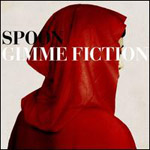
7 :: Spoon
Gimme Fiction
(Merge)
Britt Daniels is a normal human guy with normal human delicacies and a normal human bandmate named Jim Eno who wears normal human ambitions on his monochrome sleeves. Britt Daniels demonstrates a healthy modicum of normal human politeness, guest starring on Veronica Mars, a show on family-friendly UPN my mom and I can enjoy together, and treating his guitar like he really respects the thing, cradling its frets firmly and fondly; Britt Daniels exudes normal human machismo without eschewing normal human vulnerabilities. Similarly, Jim Eno practices normal human conservativeness, confident enough to create time signature illusions and hold a solid, repetitive cadence, but understandably less showy than a normal human lead singer, and, therefore, given much less credit than his normal human buddy. Thus, we must conclude, Spoon plays normal music with normal instruments in normal outfits, the pleasant stuff of 206 bones.
Alright, I apologize, “normal” is as relative an adjective as “beautiful” and three times as useless. Spoon is far from normal, wherever that may be, drilling out catchy, tersely orchestrated pop songs with absolutely no pretension, save the sheen of simplicity greased over Gimme Fiction. But there’s the brilliance, as Amir’s already elucidated: Spoon succeeds by aping a typical, mediocre rock band and infusing each song with anarchic song structures and tricky turns of key, allowing the musings of Daniels’s lyrics to reflect, succinctly, a subtle attitude in the notes.
“My Mathematical Mind” has no chorus, a consistent phrase segmented by brief attacks of shrapnel, but such a quirky approach is made less gimmicky or just less obvious by the irresistible bounce between Britt and Jim. “Beast and Dragon, Adored,” is ramped from safe to sinister by its time signature, and then there’s “Sister Jack” wrestling a fat stomp, “I Summon You’s” hypnotic lust, and every fucking song hugging close a secret, acting normal but really being so much more. Eventually, travailing the illusions and fictions of normal human vanity, the demand of Spoon’s 5th album’s title is achieved, and the audience accepts Britt doing whatever the hell he wants. So, there you have it: stripping away and laughing along with the fictions of a normal human life, Spoon seems to desperately crave their own masks and shields and lies, veiling their incessantly huge songs with normal red hoods. Almost like every other indie act out there, only way tighter.
Dom Sinacola

6 :: Andrew Bird
The Mysterious Production of Eggs
(Righteous Babe)
Andrew Bird’s first post-Bowl of Fire project managed to be not only a great record the first time through but also to have one of the highest replay values of any album I heard this year. It’s something in the combination of the perfectly molded arrangements, the championship whistling, and Bird’s cleverer-than-thou lyrics that make Production of Eggs undeniably likable.
It’s also one of those records where everyone seems to pick a different a favorite track. For me it’s the absolute gorgeous, morose, and overlooked closer “The Happy Birthday Song,” but I’ve heard plenty of support for the word-play of “Nervous Tic Motion of the Head to the Left,” the anti-IQ rallying cry of “Measuring Cups,” and the lovely indie-rocker “The Naming of Things.” Every song is just that good.
Peter Hepburn

5 :: Clap Your Hands Say Yeah
Clap Your Hands Say Yeah
(Self-released)
Remarkably self-assured for a debut album, CYHSY found themselves tagged as ‘05’s hype-rock darlings only because their record featured so many signposts that hipsters find instantly recognizable. “Let the Cool Goddess Rust Away” cribbed licks from Pablo Honey, the watery guitar riff on “In This Home On Ice” is way I Can Hear the Heart-era Ira Kaplan, and frontman Alec Ounsworth’s whinier-Thom Yorke meets David Byrne shtick led many a scribe to believe that we were witnessing the second coming of the Talking Heads. Then there was that completely hysterical controversy surrounding their stint “opening” for The National where most of the crowd (cough, cough, Newell, cough), desiring merely to cash in on the hype, made for the exits before the headliner hit the stage (a shame too, as Alligator is the better record).
Personally, I dig Ounsworth’s band just because they make me feel giddy. “The Skin of My Yellow Country Teeth,” “Is This Love?” and “Heavy Metal” comprise the greatest 1-2-3 in the middle of an album I’ve heard this year, and Ounsworth is one of the more notable frontmen to emerge in recent months; nasal almost to the point of annoyance, but perpetually witty and detached (not to mention always looking pissed off onstage). A tidy 38 minutes that leaves the listener hungry for more, Clap Your Hands Say Yeah’s self-titled debut has never failed to put me in a better mood.
David M. Goldstein
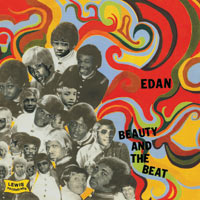
4 :: Edan
Beauty and the Beat
(Lewis)
So here we are, late December… and a white guy still owns the rights to the best hip-hop album of the year. From its initial leak in the middle of January to now, Edan’s triumphant revisit to the waning independent rap periphery has dusted every competitor in nearly every category an album of this sort can be judged upon. Boiling down the art to its most basic elements, mixing and matching molecules to form new, more eye-popping compounds; Beauty and the Beat reverted music to a pure science with a virtually matchless ease and efficiency.
Trading in the hellacious nerd-wit of his last underground smash, Boston native Edan Portnoy went back to the lab with a reaffirmed confidence in his craft, and came out with a mixture packing twice the potency of his earlier work. The elaborate chemistry behind the collage of pigment and sonance infused into every moment of this hair raising journey through funk, psychedelic, prog, and jazz is truly surreal. Structure is almost transparent, but behind an orchestra of instrumentation and tonality lays one of the most vivid visual hip-hop albums to come out in years. Efficaciously utilizing the music of his predecessors, Portnoy gave a brand new take on what drugged up genre splicing could sound like. The synoptic of pharmaceutical induced nightmares and freak-outs transcend the threshold of bizarre and blast it to a terrifying new paramount. Creative assumptions come unglued around “Making Planets”; the astonishing time warped space-capade that leaves the listener on the other side of a black hole dodging verbal rockets put forth by Edan and the often dazzling Mr. Lif. Rarely in rap is something this abstract this good.
But enough about the beats; this is rap album of the year, lets talk rhymes. Whether it’s a nod to his idols, a subtle industry sting, or a quick witted jab at life’s nuances; Portnoy’s laser sighted tongue knew few bounds. With an unprecedented knowledge of his trade, it’s hard not to believe every word that hammer through the man’s lips. Both a scholar and an architect, Edan’s mashed lyrical (“I wore the Prime Meridian as a wrist band / and gave away my riches / but I still remained a rich man”) and musical ambition give way to an impressionist hip-hop record for the ages. More a maniacal experiment than an album; in 2005 the hazy kaleidoscope of shapes and sounds that comprised Beauty and the Beat stood alone in their ingenuity.
Connor Morris
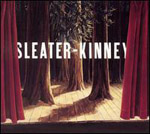
3 :: Sleater-Kinney
The Woods
(Sub Pop)
So two established indie bands sign to Sub Pop this year with the same established producer (Dave Fridmann) in tow, the lot of them united in their apparent quest to make two in-every-sense LOUD records that you can’t put on your damn mix tape/CD without (sigh) work. First we had Low last winter, their transformation less than miraculous; they at least opted for moderation, though, using The Great Destroyer‘s “new album for new label!” momentum to tastefully widen their “breadth in tone and emotion with a few additional dabs of color.” Sleater-Kinney, that other band, went the absurdly obese route, shellacking every recognizable trait of their sound with grotesque layers of badly EQ’d distortion, mixed and mastered so highly that even at low volumes it hits with a titanic force.
But The Woods is a lot more than just Fridmann’s unrelenting production, and certainly a lot more than some has-been rock grrrls trying their best to hide a lack of real songs with mid-range and bad solos. The band’s playing is better than it’s ever been; Corin’s voice raises forcefully above the stratosphere of fuzz (the chorus of “Let’s Call It Love” is mindshattering), and Carrie Brownstein’s leads are still intricate, loose-but-precise compliments to Tucker’s equally disjointed rhythms (I remember reading that Dig Me Out or The Hot Rock didn’t have a single chord, though that’d be an awfully strict concept of a “chord”), just louder, more prominent. Janet Weiss’ drumming (predictably) shames any other rock record I heard in 2005, and is in large part reason the band adapts so well to their new “sumo wrestling whereas wolf parade is judo done by ninjas*” sound, as Newell would put it. But he also hates this record, so I just don’t know about that guy.
It’s the perfectly timed reinvention of a band that isn’t really a reinvention at all; it doesn’t drastically change anything about the band’s songwriting or lyrical approach, besides thickening the sound 200% to further forgive their lack of a bass player. It’s just from a band that I —- and many others, I’m sure —- figured had already peaked and could only disappoint after their last “who knew they had this in them?” record, One Beat. I’m sure the lesson here involves something about everyone just underestimating the band —- that we should’ve expected something this good in the first place because this is Sleater-Kinney, and they haven’t made an “ok” record since their debut. Call the Doctor through One Beat was an incredible run, and underneath The Woods‘ partial gimmick is another great Sleater-Kinney record, and it’d be THE rock album of 2005 if it weren’t for that other one we freaked out over.
*(“Sufjan is water-aerobics.”)
Scott Reid
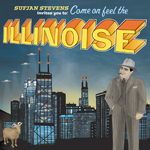
2 :: Sufjan Stevens
Illinois
(Asthmatic Kitty)
I’ve been thinking pretty hard lately about Illinois, about why it’s far and away my favourite album in a year of many good ones, several great ones, and even a small handful of records that took my life over for weeks on end. This year produced heaps of worthwhile albums, but Illinois was the only one I kept returning to again and again, the only one that’s been on at least a twice-a-week rotation since it leaked back in April, the only one that can get my spine tingly just by thinking about it. Part of it was that it came out of nowhere – I could never (and have still yet to) get into Michigan, I ignored Seven Swans, and I only initially downloaded Illinois out of idle curiosity, thanks to Crazy Greenwald’s early assertion that it warranted “a combined rating of, like, a million.” I don’t know if I was more shocked by the album or the fact that Greenwald was right.
There has never been an album like this. Sufjan mixes history, philosophy, spirituality, and personal narrative with the touching eccentricity of a young Dylan; he weaves Illinois into a coherent musical suite like SMiLE-era Brian Wilson; he throws in strange time signatures and transitions with an effortlessness that would do Jonny Greenwood proud. Illinois flutters with strings, horns, woodwinds, banjos, organs, a small female choir, even a noisy guitar solo. And somehow there are still idiots who want to call this “freak folk.”
Yes, there is an inherent ridiculousness in this record, and in Stevens himself. The song titles are often sentences-long, the (actually pretty ugly) cover features Al Capone, (formerly, pre- hilarious injunction) Superman, and a flying saucer superimposed over the Chicago skyline, and Stevens leads his live audience through cheerleader routines between songs. I mean, the album is subtitled Sufjan Stevens Invites You To Come On Feel The Illinoise! for chrissakes.
But it’s often this ridiculousness that makes the album so moving – for instance in the title track, Stevens is visited in a dream by the ghost of Carl Sandburg, who advises him to write from the heart, and the record is stocked with bizarre lyrical nuggets like “Stephen A. Douglas was a great debater but Abraham Lincoln was the Great Emancipator,” and “what have we become America? Soldiers from the great frontier!” Coming from anyone else, this would come off as the worst kind of insufferable bullshit, but in Stevens’ universe, which somehow makes irony and sincerity one and the same, they are absolutely captivating. That he can so stealthily marry this bombast with quietly harrowing tracks like “John Wayne Gacy, Jr.” and “Casimir Pulaski Day” gives Illinois a depth rare in pop music of any genre or period.
So while Apologies to the Queen Mary, Twin Cinema, Gimme Fiction et. al are stunning records in their own right, Illinois is, to me at least, the only record of 2005 that sounds like the work of real genius. It’s a kaleidoscopic American daydream, where serial killers, superheroes, ex-presidents, zombies, gangsters, and regular, lonely people like you and me all meet for a ride on the Ferris Wheel or a trip to the swamp, or a long drive through the praries. It’s the kind of album that nerds like me will be overanalysing for years to come, and that it comes from a guy who apparently didn’t even consider songwriting as more than a hobby until his mid-twenties, it’s all pretty astonishing stuff. So bicker all you want about the bulky instrumentals, overly precious vocals or silly song titles —- Illinois broke more ground and more hearts than any indie album this year, and I’m just glad to have been here to experience it firsthand.
Matt Stephens

1 :: Wolf Parade
Apologies to the Queen Mary
(Sub Pop)
Wolf Parade isn’t number one on this list as a token, as lip service, as a shrug and a quota met, “Let’s see what next year has to offer.” Their album’s number one because, when heard with a holistic ear, the spirit and blood of the thing roars a demand: take all of if it together and recognize that Wolf Parade tap straight way to what’s at the core of “songwriting.” You know, self-expression, what.
It’s easy to deride each instrument’s voice for being simple, but Wolf Parade’s simplicity is half of their brutal elegance (and Spencer has his amateur hour Bach moments). Those drums, those synths, that guitar, those warbling echoes: Wolf Parade make them creatures, creatures in the same environment, feeding off each other and evolving with each other, three or four parts put through several variations and those mutations structured for progression and, ultimately, pyrrhic release. Whatever awkwardness there is in the key line of “Same Ghost Every Night” is present because the song is searching for its resolve, for that coda where the thought of “We are raised up very high” sends the keys into a harmonic overdrive, like that of my local organist playing a hymn’s final verse.
And let’s not confuse passion with “emo,” for what can Wolf Parade’s forceful words do but burst out their bowels, tear through their throats, leap from their lips? Then the lines scurry forward as little beasts (the torment they’ve caused in their hosts, a vague horror at the sight). “I am my father’s son” and “There’ll be no more dinner bells” and what not. Has the album no Great Point? As it is with most good works, probably not much of one Great Point specifically and thoroughly intended, but surely a few points implied and open to boundless inference, a game which I’ll now play: because, when I listen to Apologies to the Queen Mary, I hear an exorcism, and it’s not rock stars expelling booze demons. I hear artists who believe themselves and all others to be the damned lost in an isolating, desensitizing, killing society.
Certainly, this is no new concept of oppression for the morose and clinically disenfranchised, but, like their punk predecessors (Wire, Burma) and unlike so many of their resigned indie peers, Wolf Parade fight. Fiercely and ingeniously they fight, raw nerve to frayed cord. Realizing early that the true ghosts are the ones with physical cages, the album rejects the mundane and civilization’s “torch” for the abstract and dissolution’s darkness, subjects sketched by moonlight. This secession’s achieved with an act of inward violence, manifest in Wolf Parade’s energy, their wild eyes and gaping maws; it is their consuming fervor that brings them, in the end, crumbling into sparking heaps of cinder upon their instruments, the liberation celebrated with one-two claps. Yes, I am talking about the closing minute of “This Heart’s on Fire,” the title of which I take so literally because spontaneous combustion seems the only reason for the song’s hope. Wolf Parade advocate for art’s heat, its self-destructive thrall, as the great escape.
So, depending on one’s feeling about the production job, maybe there still remains the desire to strike Isaac Brock in the balls, but at least those balls saw fit to bring the modern world an album by the ones that got away. Makes me want to claim a pen or a camera or a guitar; then I’d flare up to follow this band, out of comfort and out of sight.





